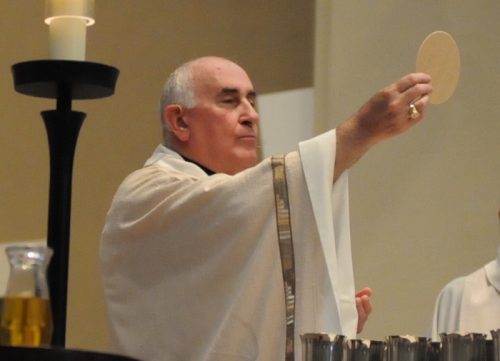Dear sisters and brothers in Christ,
I recently attended the U.S. bishops’ Spring Plenary Assembly during which we voted to move ahead with the drafting of a teaching document about the Eucharist. Unfortunately, much of the media coverage about this decision by the bishops misconstrues what we actually voted for and the nature of the document itself. Let me explain.
The document, as proposed, would be comprised of three sections: “The Eucharist, A Mystery to be Believed,” “The Eucharist, A Mystery to be Celebrated” and “The Eucharist, A Mystery to be Lived.” It would address the Church’s teaching about the Real Presence of the body and blood of Christ in Communion; celebrating the sacrament with reverence and beauty, uniting us in praise; and moral transformation, eucharistic consistency and missionary discipleship.
The issue of “eucharistic consistency” has received the most attention, with some saying that we bishops are seeking to write a national policy on withholding Communion from Catholic politicians, including President Biden, who support access to abortion. This isn’t the case. There will be no national policy. The bishops did not — and will not — debate or vote to bar any individual from receiving Communion. Whether or not to withhold Communion is a matter between an individual, his or her pastor, and his or her bishop.
What we did discuss is how to foster a deeper appreciation for the beauty and mystery of the Eucharist, how it unites us as the body of Christ, and how we should best prepare ourselves for its celebration and reception. We also discussed some of the current challenges the Church faces: declines in Mass attendance, the impact of the coronavirus, and concerns that many Catholics don’t believe in, or don’t understand, the Church’s teaching about the Real Presence in the Eucharist.
As the pandemic subsides and we return to normal parish life, I believe this is an opportune time for all of us — clergy and laypeople — to deepen our understanding of this sacrament as the source and summit of our faith. My hope is that our parishes and Area Catholic Communities would use this resource as a teaching opportunity.
Over the next few months, I will be consulting with our regional bishops regarding the final text. These are my hopes for the document:
- that it would be broadly focused and help us to better understand the Real Presence and what this means for us as individuals and for the body of Christ.
- that it helps us understand that the Eucharist has both an individual and social dimension. We come together as the People of God to worship with one heart and voice. In the Eucharist, we encounter Christ in a very personal way. This encounter has the power to transform us, sending us and the entire body of Christ on mission to transform our world in His name.
- that it recognizes the Eucharist’s power to heal. Yes, there are serious reasons for which one should abstain from receiving Communion, but we also must not lose sight that the Eucharist is “not a prize for the perfect but a powerful medicine and nourishment for the weak,” as Pope Francis said in his apostolic exhortation “Evangelii Gaudium” (“The Joy of the Gospel”).
- that it would help us to reflect more deeply on unity and the obligation for all of us — not just politicians — to live according to the core principles of Catholic moral and social teaching. This includes the Church’s teaching about abortion, euthanasia and the death penalty. It also includes racism, how we treat our neighbors, how we respond to the poor and vulnerable, and how we care for the creation that God has entrusted to us.
- that it will help us to prepare for the upcoming National Eucharistic Revival. This multi-year renewal effort seeks to reignite our eucharistic faith. You will be hearing more about the eucharistic revival — and our diocese’s participation in it — in the coming months.
As you may know, our Spring Assembly was conducted entirely online. I was among the bishops who asked before the meeting that the discussion about the teaching document be delayed until we could once again meet in person in the fall. I felt that any document about the Eucharist — which is at the heart of our identity as Catholics — needed the kind of vigorous and thorough discussion that can only happen in person. Furthermore, I felt a delay was in keeping with the request of the Vatican Congregation for the Doctrine of the Faith to take the necessary time for dialogue and discernment so that any teaching document would foster unity and not more division.
That said, I am satisfied with the level of discussion we were able to have during the Spring Assembly, and I look forward to the regional discussion among bishops to help guide the final text of the document before all the bishops are asked to vote on it. Please pray for me and all the bishops as the drafting of this teaching document moves forward.
Sincerely yours in Christ,
+Donald J. Kettler
Bishop of Saint Cloud
Photo: Bishop Donald Kettler celebrates ordination Mass at St. Mary’s Cathedral in St. Cloud in June 2015. (Photo by Dianne Towalski / The Central Minnesota Catholic)























No one has ever thought the Eucharist as a prize for the perfect. However for the sake of coherence, can’t we agree that those publicly declaring their opposition to the Church must be denied the Eucharist until they publicly repent? There is no argument to justify that our ministers assist them to drink and eat their own damnation.
Thank you, Bishop Don for your clarification. May the Holy Spirit guide the bishops and the laity.
I appreciate reading this, Bishop Donald. I especially appreciated the “not a prize for the perfect..” quote. Imperfect Red Grewing